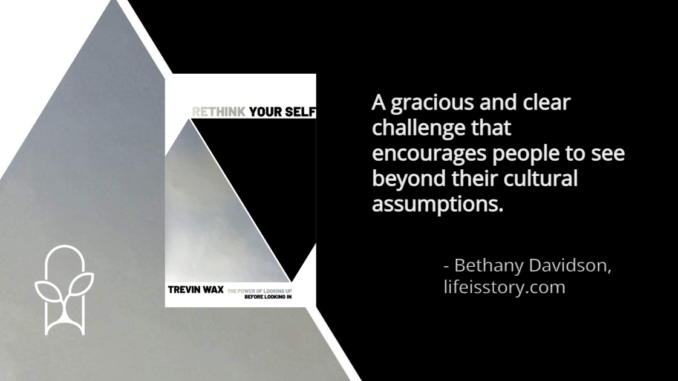
Also by this author: The Thrill of Orthodoxy: Rediscovering the Adventure of Christian Faith
Published by B&H Publishing on October 20, 2020
Genres: Non-Fiction, Apologetics, Christian Life, Theology
Buy on Amazon
Goodreads

Follow your heart. You do you. You are enough.
We take these slogans for granted, but what if this path to personal happiness leads to a dead-end? In Rethink Your Self, Trevin Wax encourages you to rethink some of our society’s most common assumptions about identity and the road to happiness.
Most people define their identity and purpose by first looking in (to their desires), then looking around (to express their uniqueness), and finally—maybe—looking up (to add a spiritual dimension to life). Rethink Your Self proposes a counter-intuitive approach: looking up before looking in.
It's only when we look up to learn who we were created to be that we discover our true purpose and become our truest selves.
In Rethink Your Self, Trevin Wax explores different philosophies for self-definition, encouraging his readers to reflect on cultural ideas about being “true to yourself” instead of building their lives on culturally absorbed philosophies that they have never thought through. Wax succinctly and clearly describes how expressive individualism has become the foundation of our culture’s thought, and points out flaws within this approach to the world. Some of his critique focuses on logical and intellectual elements of this philosophy, but the rest emphasizes emotional elements, such as the loneliness and dissatisfaction that people feel when they cannot live up to their own standards and feel like failures because they can’t reach the bar of success in a culture that tells them that they can do and be anything that they want.
Wax briefly contrasts this view of human identity with perspectives from collectivist cultures, and shows how Jesus’s wisdom challenges both of these approaches to life. Wax argues that people should look up, then around, and then in when forming their identities, and writes that even though some people adopt religious affiliations as a way to express themselves and as an accessory to their lives, the greatest fulfillment comes through a “redesign” into who God made you to be, instead of using spirituality to prop up your own goals. He shows how Christianity provides a better story in which people can find themselves, and provides practical advice for how people can retrain their self-defining approaches to life.
Wax writes with sensitivity to seekers and skeptics, and this popular-level guide does not require a deep intellectual approach or an existing interest in Christianity. However, even though Rethink Your Self: The Power of Looking Up Before Looking In is primarily targeted towards people who have never thought deeply about social messages regarding identity before, it also serves a purpose for people who are already well versed in issues related to individualism, because Wax provides a great example for how people can discuss this topic with others at its most basic levels. Overall, this book is a gracious and clear challenge that encourages people to see beyond their cultural assumptions, set aside an individualistic lens, and consider the message of Christianity from within.
